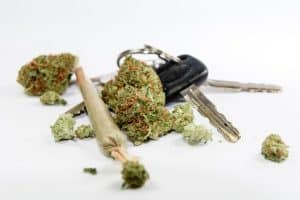Marijuana DUI Defense After Recreational Legalization
 Maryland voters said yes to recreational marijuana, and on July 1, 2023 adults began buying weed legally. What did not change was the rule against DUI/DWI. Intoxication is still intoxication whether you’re drunk or stoned. Prosecutors still rely on Transportation Article § 21‑902, but now the pool of everyday users is bigger.
Maryland voters said yes to recreational marijuana, and on July 1, 2023 adults began buying weed legally. What did not change was the rule against DUI/DWI. Intoxication is still intoxication whether you’re drunk or stoned. Prosecutors still rely on Transportation Article § 21‑902, but now the pool of everyday users is bigger.
With legal cannabis, clients are confused—how does impairment get proven now? The question lands in every consultation. The state must still prove you were “under the influence to the extent that you cannot drive safely.” The long answer is why defense lawyering matters.
How police decide if you’re high behind the wheel
Traffic stops usually start with a minor issue—speeding, a tag light, drifting. If the officer smells marijuana, sees red eyes, or hears slow speech, the investigation shifts gears. Expect roadside Standardized Field Sobriety Tests adapted for drugs, plus the 12‑step Drug Recognition Expert (DRE) protocol.
A DRE officer will check your pulse, blood pressure, pupil size and muscle tone. They may ask you to cross your eyes. The sequence sounds clinical, yet it is rooted in training manuals, not medical journals. Anything you say about your day’s cannabis use will appear in the report.
No THC number to hang their hat on
Unlike Colorado’s 5‑nanogram threshold, Maryland has no per‑se limit for THC. Police must get a warrant to draw blood, and laboratories measure both active THC and inert metabolites. Active THC falls quickly; a blood sample an hour later may read low even if you felt intoxicated at the wheel.
Regular users face another problem: metabolites linger for days, even weeks. A lab sheet showing 30 ng/mL of carboxy‑THC proves only prior exposure, not present impairment. That gap between chemistry and behavior is fertile ground for cross‑examination.
Comparing Maryland to Colorado, Washington, and others
Colorado and Washington adopted the same 5 ng/mL rule. Nevada uses 2 ng/mL. Illinois went with 5 ng/mL but allows a safe‑harbor defense if the driver shows no bad driving. Pennsylvania lowered its limit to 1 ng/mL, practically a zero‑tolerance approach.
Maryland, like neighboring Virginia, keeps the open‑ended impairment standard. Prosecutors must knit together clues—driving patterns, demeanor, DRE notes, toxicology–to convince a jury beyond a reasonable doubt. Jurors used to breath tests for alcohol often find the cannabis puzzle less straightforward.
Common defense angles that still work
Reasonable suspicion and probable cause. If the original stop lacked a legal basis, all evidence obtained as a consequence may be suppressed.
Field sobriety doubts. The horizontal gaze nystagmus test flags alcohol, not cannabis. Even the National Highway Traffic Safety Administration admits limited usefulness for marijuana.
DRE shortcomings. Judges increasingly recognize that the protocol was born in the 1970s Los Angeles Police Department, not peer‑reviewed science. A strong cross-examination can expose confirmation bias.
Timing of the blood draw. Active THC can drop steeply within half an hour. A delayed sample can undercut the state’s narrative of strong impairment.
Medical cannabis card. Registered patients can lawfully possess what officers find in the car, blunting any claim that quantity alone equals intoxication.
Penalties if you do nothing
A first‑offense marijuana DUI carries up to one year in jail, a $1,000 fine, and up to 12 points on your license, which can result in revocation. A refusal or a positive blood test triggers an MVA suspension—180 days for a first fail and 270 days for refusal. Insurance rate hikes follow quickly.
A second conviction doubles jail exposure to two years. Felony charges loom if a crash causes serious injury. Potential employers and federal agencies still treat a marijuana DUI like any other drug crime.
Real‑world tips for protecting yourself
Keep your registration, insurance card and driver’s license handy to avoid fumbling. Do not volunteer how much you smoked or when. Politely refuse field sobriety tests; they are voluntary in Maryland. Ask for a lawyer to be present while you answer any questions. A blood draw requires a warrant—make officers do their paperwork.
Most importantly, plan ahead. If you use cannabis recreationally or medically, designate a sober driver or use a ride‑share. A $30 fare beats a criminal record.
Technology behind THC testing
Labs use gas chromatography and mass spectrometry to separate active delta‑9‑THC from its metabolites. The machines are sensitive to parts per billion, yet they cannot measure how you handled the steering wheel three minutes earlier. That disconnect makes expert testimony critical.
Blood samples must travel on ice from hospital to lab. Chain‑of‑custody slips sometimes show gaps—wrong initials, missing seals, or late arrivals. A single paperwork lapse can persuade a judge to strike the toxicology report, leaving the prosecution with little more than officer impressions.
What to expect at your first court date
Your initial appearance is usually in District Court. The judge advises you of the charges against you and the penalties. While you can request a jury trial, which bumps the case up to Circuit Court, that deprives you of an opportunity to view the State’s evidence in the District Court first. Under Maryland law, if you are dissatisfied and note an appeal to the Circuit Court, your appeal is a new trial with the bonus that you can obtain a transcript of what was testified to in the District Court so that it is very hard for an officer to change his testimony on appeal.
After you are charged, if your driver’s license has been confiscated, you need to discuss your driving options with an attorney immediately as there are deadlines regarding when you can request an MVA hearing – and it may not be necessary to request an MVA hearing at all under certain circumstances. The key is to keep you driving to work while the criminal case unfolds, easing pressure to accept a quick plea.
Your next move starts here
Carey Law Office has defended Maryland drivers for nearly four decades. If you are facing a marijuana DUI, reach out today for a free strategy session. A local lawyer who knows every courthouse and Drug Recognition Expert in the state may be able to help you keep your license, your record, and your peace of mind. Contact us today for a consultation.

My name is Joe Carey, and I am the founder and principal attorney of the Carey Law Office. I have lived in Maryland my entire life. I grew up in a small town in Prince George’s County and, with the help of my partner in life, Nancy, I raised my family here: three exceptional children (a son and two daughters), and two goofy, spoiled black Labrador Retrievers. Learn More
